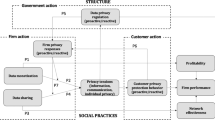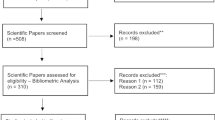Abstract
The importance of ethical consumerism to many companies worldwide has increased dramatically in recent years. Ethical consumerism encompasses the importance of non-traditional and social components of a company's products and business process to strategic success – such as environmental protectionism, child labor practices and so on. The present paper utilizes a random utility theoretic experimental design to provide estimates of the relative value selected consumers place on the social features of products.
Similar content being viewed by others
References
Aaker, J.: 1997, ‘Dimensions of Brand Personality’, Journal of Marketing Research 34(3), 347–356.
Aaker, J. and D. Mahaeswaran: 1997, ‘The Effect of Cultural Orientation on Persuasion’, Journal of Consumer Research 24(4), 315–328.
Abratt, R. and D. Sacks: 1988, ‘The Marketing Challenge: Towards Being Profitable and Socially Responsible’, Journal of Business Ethics 7, 497–508.
Ajzen, I. and M. Fishbein: 1980, Understanding Attitudes and Predicting Social Behavior (Prentice Hall, Englewood Cliffs, NY).
AsiaWeek: 2001, ‘Fair Pay’, 27(1).
Bhate, S. and K. Lawler: 1997, ‘Environmentally Friendly Products: Factors That Influence Their Adoption’, Technovation 17(8), 457–465.
CAFOD: 1998, ‘Views from the South, Conference Report on Ethical Trade’, September, http://www. cafod.org/uk/policyviews.htm.
Calder, B., L. Phillips and A. Tybout: 1981, ‘Designing Research for Application’, Journal of Consumer Research 8(3), 197–207.
Calder, B.: 1982, ‘The Concept of External Validity’, Journal of Consumer Research 9(4), 240–244.
Christie, R. and F. L. Geis: 1970, Studies in Machiavellianism (Academic Press, New York).
Click, J.: 1996, ‘New Business Standards Focus on Human Rights’, HRMagazine 41(6), 65–72.
Crane, A.: 2001, ‘Unpacking the Ethical Product’, Journal of Business Ethics 30, 361–373.
Economist: 1999, ‘Business Ethics: Sweatshop Wars’, 27 February, 68–69.
Edmonds, E. and N. Pavcnik: 2002, ‘Does Globalization Increase Child Labor? Evidence from Vietnam’, Working paper No. 8760, National Bureau of Economic Research, Cambridge, MA.
Elliott, K. A. and R. B. Freeman: 2001, ‘White Hats or Don Quixotes? Human Rights Vigilantes in the Global Economy’, Working paper No. 8102, National Bureau of Economic Research, Cambridge, MA.
Erdem, T. and J. Swait: 1998, ‘Brand Equity as a Signaling Phenomenon’, Journal of Consumer Psychology 7(2), 131–157.
Fairclough, G.: 1996, ‘It Isn't Black and White’, Far Eastern Economic Review 159(10), 54–57.
Folkes, V. S. and M. A. Kamins: 1999, ‘Effects of Information About Firms' Ethical and Unethical Actions on Consumers' Attitudes’, Journal of Consumer Psychology 8(3), 243–259.
Fullerton, S., K. B. Kerch and H. R. Dodge: 1996, ‘Consumer Ethics: An Assessment of Individual Behavior in the Market Place’, Journal of Business Ethics 15(7), 805–814.
Garrett, D. E.: 1986, ‘Consumer Boycotts: Are the Targets Always the Bad Guys' Business and Society Review (Summer), 17–21.
Glendon, M. A.: 1998, ‘Propter Honoris Respectum: Knowing the Universal Declaration of Human Rights’, Notre Dame Law Review 73(5), 1153–1190.
Lerner, L. D. and G. E. Fryxell: 1988, ‘An Empirical Study of the Predictors of Corporate Performance: A Multi-Dimensional Analysis’, Journal of Business Ethics 7(12), 951–959.
Louviere, J. J., D. A. Hensher and J. D. Swait: 2000, Stated Choice Methods: Analysis and Applications (Cambridge University Press, Cambridge, U.K.).
Luh, S. S.: 2001, ‘Nike Factories Accused of Intimidating Workers’, Asian Wall Street Journal (17 May).
Luzar, E. J. and K. J. Cossé: 1998, ‘Willingness to Pay or Intention to Pay: The Attitude-Behavior Relationship in Contingent Valuation’, Journal of Socio-Economics 27(3), 427–444.
Manrai, L. A., A. K. Manrai, D. N. Lascu and J. R. Ryans Jr.: 1997, ‘How Green-Claim Strength and Country Disposition Affect Product Evaluation and Company Image’, Psychology and Marketing 14(5), 511–537.
Marymount University Center for Ethical Concerns: 1999, ‘The Consumers and Sweatshops’, November, http://www.marymount.edu/news/ garmentstudy/overview.html.
Miller, C.: 1997, ‘Marketers Weigh the Effects of Sweatshop Crackdown’, Marketing News 31(10), 1, 19.
Osterhus, T. L.: 1997, ‘Pro-Social Consumer Influence Strategies: When and How Do They Work?’, Journal of Marketing 61(4), 16–29.
Pitts, R. E., J. K. Wong and D. J. Whalen: 1991, ‘Consumers' Evaluative Structures in Two Ethical Situations: A Means-End Approach’, Journal of Business Research 22(2), 119–130.
Ranjan, P.: 2001, ‘Credit Constraints and the Phenomenon of Child Labor’, Journal of Development Economics 64, 81–102.
Rest, J.: 1983, ‘Morality’, in P. H. Mussein (series ed.), and J. Flavell and E. Markman (vol. eds.), Handbook of Child Psychology: Vol. 3. Cognitive Development, 4th Edition (Wiley, New York), pp. 556–629.
Rest, J.: 1984, ‘The Major Components of Morality’, in W. Kurtines and J. Gerwitz (eds.), Morality, Moral Behavior, and Moral Development (Wiley, New York), pp. 24–40.
Rest, J.: 1986, Moral Development: Advances in Research and Theory (Praeger, New York).
Rest, J., L. Edwards and S. Thoma: 1997, ‘Designing and Validating a Measure of Moral Judgment: Stage Preference and Stage Consistency Approaches’, Journal of Educational Psychology 89(1), 5–28.
Rest, J., D. Narvaez, M. J. Bebeau and S. J. Thoma: 1999, Postconventional Moral Thinking: A Neo-Kohlbergian Approach (Lawrence Erlbaum Press, Mahwah, NJ).
Roberts, J. A.: 1996, ‘Will the Real Socially Responsible Consumer Please Step Forward?’, Business Horizons 39(1), 79–83.
Shrum, L. J., J. A. McCarty and T. M. Lowrey: 1995, ‘Buyer Characteristics of the Green Consumer and Their Implications for Advertising Strategy’, Journal of Advertising 24(2), 71–82.
Smith, C. S. and A. C. Copetas: 1998, ‘Former Chinese Prisoner Claims Adidas Balls Were Made in Prison’, Wall Street Journal (26 June).
Sriram, V. and A. M. Forman: 1993, ‘The Relative Importance of Products' Environmental Attributes: A Cross-Cultural Comparison’, International Marketing Review 10(3), 51–70.
Teoh, S. H., I. Welch and C. P. Wazzan: 1999, ‘The Effect of Socially Activist Investment Policies on the Financial Markets: Evidence from The South African Boycott’, Journal of Business 72(1), 35–89.
Thoma, S. J., J. Rest and R. Barnett: 1986, ‘Moral Judgment, Behavior, Decision Making, and Attitudes, in J. Rest (ed.), Moral Development: Advances in Theory and Research (Praeger, New York), pp. 133–175.
rep.html.
Whalen, D. J., R. E. Pitts and J. K. Wong: 1991, ‘Exploring the Structure of Ethical Attributions as a Component of the Consumer Decision Model: The Vicarious Versus Personal Perspective’, Journal of Business Ethics 10(4), 285–293.
Author information
Authors and Affiliations
Rights and permissions
About this article
Cite this article
Auger, P., Burke, P., Devinney, T.M. et al. What Will Consumers Pay for Social Product Features?. Journal of Business Ethics 42, 281–304 (2003). https://doi.org/10.1023/A:1022212816261
Issue Date:
DOI: https://doi.org/10.1023/A:1022212816261




